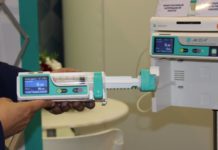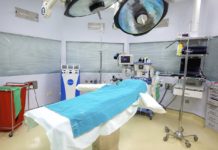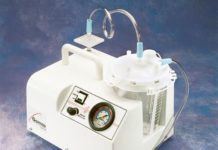Dental care has evolved with humanity. If at the beginning of time people got by with ashes and homemade brushes from young tree branches, then modern dentistry offers the latest options at the junction of pharmacology and technology - oral irrigators. What kind of device it is, what is it for, which model is better to choose, you will learn from the article.
Attention! The ranking of the best oral hygiene irrigators popular in 2020 can be viewed here.
Content
- 1 Irrigator - Oral Hygiene Guru
- 2 Top 10 best models of irrigators
- 2.1 Panasonic EW-DJ10 A520
- 2.2 Panasonic EW1211А
- 2.3 CS Medica AquaPulsar OS-1
- 2.4 Philips Sonicare Air Floss
- 2.5 Donfeel OR-820 D
- 2.6 Aquajet LD-A7
- 2.7 WaterPik WP-450 E2
- 2.8 Braun Oral-B Professional Care OxyJet MD20
- 2.9 Rio Professional Water Flosser & Oral Irrigator
- 2.10 Waterpik WP-452 E2 Ultra Professional Designer Series
- 3 Dental centers
- 4 How to choose an irrigator. Criterias of choice
Irrigator - Oral Hygiene Guru
A visit to the dentist's office is a serious stress. In order for the visits to be only of a preventive nature, you need to carefully look after the oral cavity. An irrigator is ideal for these purposes. This is a specialized electric device for cleaning teeth, interdental spaces, gums from plaque with a thin stream of water or a special liquid under high pressure. The power of the built-in mini-pump is about 40 watts, which creates a pressure of up to 800 kP. The cleaning fluid can be supplied in three ways:
- Inkjet. The appliance delivers a thin, continuous stream of water.
- Pulsed. Water is supplied in a thin intermittent stream. Micro-hydraulic shocks with a frequency of up to 1400 per minute are practically not felt.
- With the formation of microbubbles. During operation, the water flow is ozonized, which creates an additional antibacterial effect.
The used shock technology is absolutely safe and at the same time allows you to effectively remove dirt from the teeth, gums, from the interdental spaces and periodontal pockets. Additionally, a light massage effect is exerted on the gums. Proper use provides complete oral care. Even good electric brushes are incapable of eliminating food stuck between the teeth one hundred percent, which leads to the destruction of the enamel in these areas. Outwardly, such a defect is practically not noticeable, the patient turns to the doctor only when caries reaches the pulp and pain occurs.
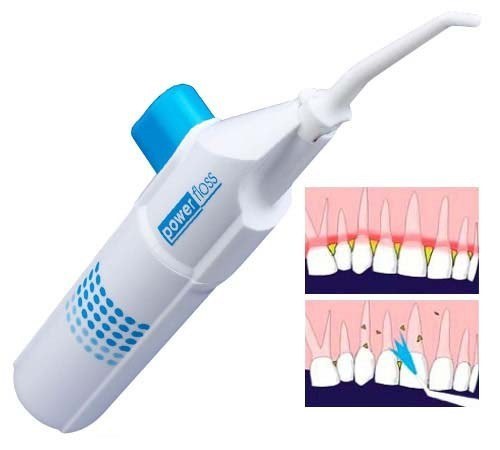
Benefits of using:
- the procedure is inexpensive in time (1-2 minutes);
- food debris is removed from the interdental spaces, cracks in tooth enamel and periodontal pockets;
- gently whitens enamel using special liquids;
- improves blood flow to the gums due to light massage;
- can be used to care for braces.
Disadvantages:
- liquid is required for work;
- does not destroy hard plaque;
- stationary models are large and require a certain amount of space in the bathroom.
The best effect is achieved when using a toothbrush and an irrigator together.
Dentists' recommendations: indications and contraindications for use
A technical novelty in oral care is not just a fashionable gadget, but a serious dental instrument for carrying out hygienic procedures.Professional dentists recommend using irrigators:
- During pregnancy and lactation. Changes in hormonal levels and metabolism lead to the leaching of calcium and weakening of protective barriers. Habitual hygiene practices often cause pain and bleeding. A stream of water from the device helps to improve the condition of teeth and gums without unpleasant sensations.
- Children during the period of changing milk teeth to permanent ones. Special models have been developed that take into account the peculiarities of pediatric dentistry.
- For the care of orthopedic and orthodontic structures.
- For the treatment and prevention of gingivitis. Hydromassage will improve the general condition of the gums, reduce bleeding, pain.
- For the treatment of periodontal disease. The device allows you to effectively clean the tooth pockets from food debris and pus, help relieve inflammation, and prevent tooth loss.
- Patients with diabetes.
- For the prevention of oral infections.
- Smokers.
- For the treatment and prevention of deep caries.
For maximum effect, use the device 3 times a week.
Irrigators, like other medical and cosmetic devices, have a list of contraindications:
- Acute form of periodontitis;
- First week after surgery;
- The first month after the installation of orthodontic appliances and multi-bonding systems;
- Oral neoplasms;
- Severe diseases of the cardiovascular system;
- Installed pacemaker.
3 types of oral irrigators
Today manufacturers offer three main types of devices.
Stationary
The device is powered from the mains. Can be placed on a shelf or mounted to a wall using a special bracket. Consist of:
- the main unit, which has a built-in fluid reservoir;
- working handle for attaching attachments;
- container for storing tips.
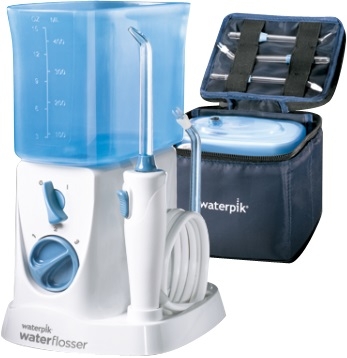
Advantages:
- There are individual and family models;
- Large selection of attachments, including for children;
- They work in several modes of water supply;
- Different types of dental fluids can be used.
Disadvantages:
- Oversized;
- Requires a separate space in the bathroom;
- Create strong vibration during operation;
- High price. The average price is 3,500 rubles.
Portable
They are an elongated handle with attachment for attachments. A container for liquid and a battery are built into the body.
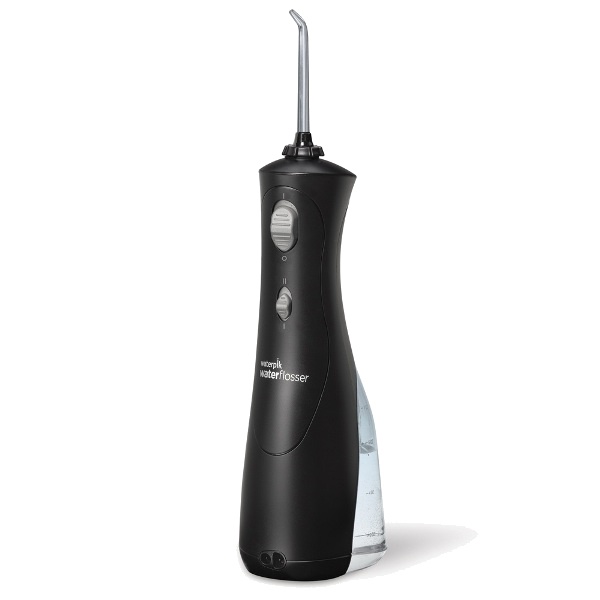
Advantages:
- Compactness;
- Little weight;
- The ability to use anywhere at any time;
- Several attachments.
Disadvantages:
- Requires frequent battery recharging;
- If the device is powered by batteries - low power level;
- Small compartment for water;
- Rapid wear of fasteners.
Flowing
They are a simple construction of a nozzle holder and a water supply hose. The hose is connected using a universal adapter with a conventional tap. Water enters the device from the water supply network.
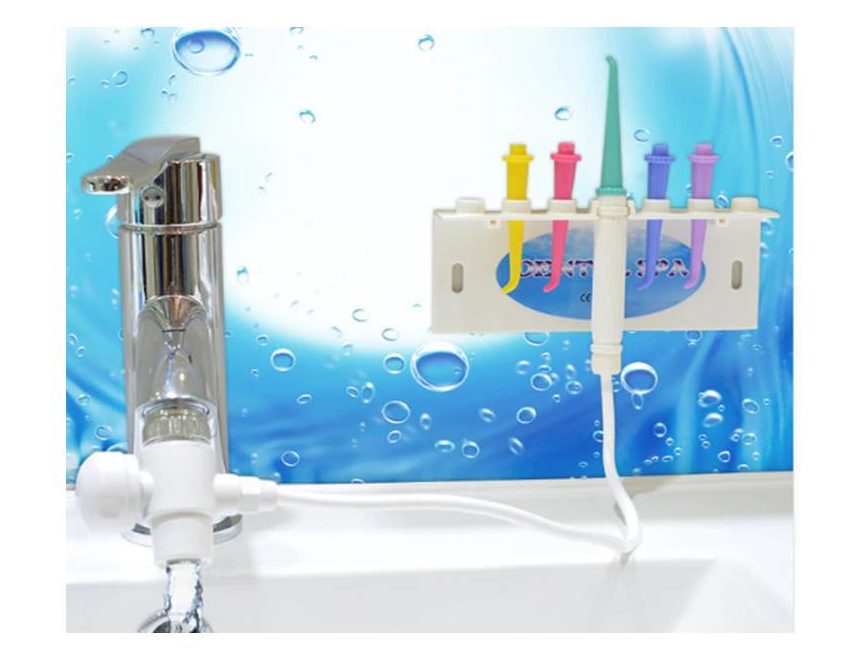
Advantages:
- Compactness;
- Does not require an energy source;
- Ease of use;
- Several attachments;
- Low cost. The average price is 2000 rubles.
Disadvantages:
- Plumbing required;
- Do not use dental fluids;
- The effectiveness of the procedures and the life of the device depend on the quality of the tap water.
| Irrigator type | Fluid supply modes | Power adjustment | Types of liquids used | Power supply |
|---|---|---|---|---|
| Stationary | jet impulse with microbubbles | + | water professional solutions household concentrates homemade solutions | power grid 220W |
| Portable | jet impulse | + | water household concentrates homemade solutions | AA batteries battery |
| Flowing | jet | - | tap water | - |
6 types of removable irrigator heads
- Universal - curved, the set includes from 3 to 8 pieces of different colors, designed for normal oral care;
- Children's - created taking into account the age characteristics of the oral cavity, do not work in a pulse mode, some models have an indicator of the permissible power;
- Periodontal - a curved tube with a thin rubber or silicone tip for accessing periodontal pockets;
- Orthodontic - curved shape, the tip ends with a small brush, through which the braces are effectively cleaned;
- For the surface of the cheeks and tongue - made in the form of a wide spoon, allows you to process a large area at a time;
- Nasal - elongated, with a soft cone at the end, intended for hygiene of the nasopharynx with warm water or saline solution.
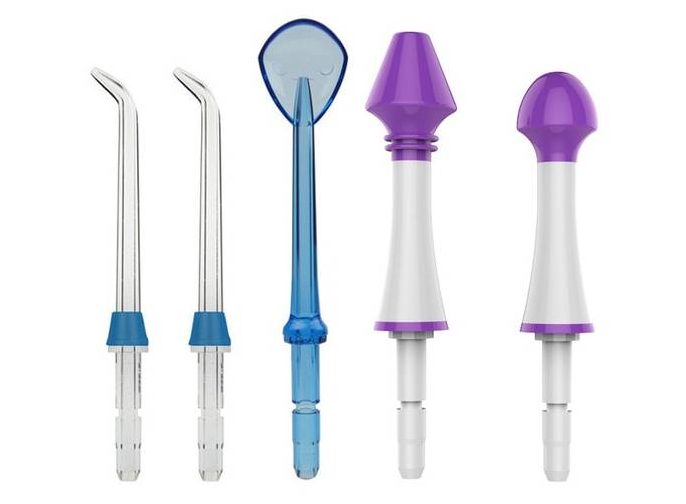
What liquids can be used instead of water
In addition to water, special fluids can be used for oral care with an irrigator:
- professional solutions used in professional dental practice, prescribed by a doctor;
- household liquids are intended for carrying out hygiene procedures at home, produced in the form of concentrates, can be: fluoride to strengthen teeth; with antiseptics for the treatment of periodontitis; reducing the sensitivity of the teeth; containing deodorant extracts;
- homemade concentrates - strained herbal decoctions or saline solutions.
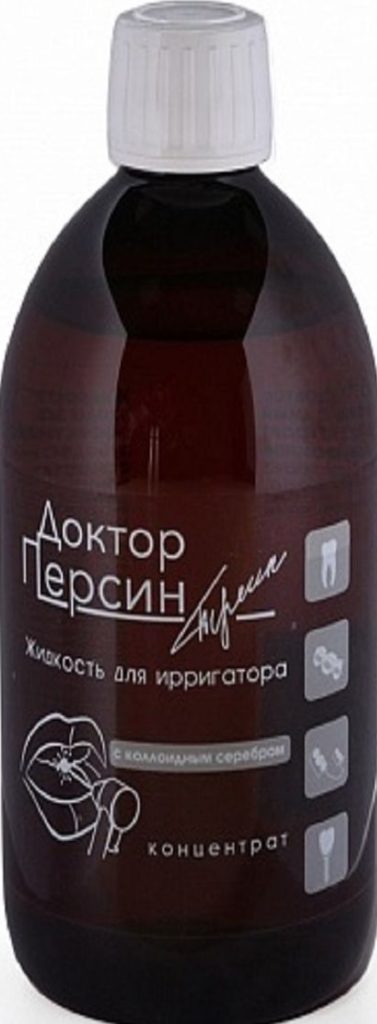
Please note: most concentrates need to be diluted with water in a 1 to 10 ratio
Top 10 best models of irrigators
Many manufacturers, a wide range of models, and an abundance of advertising present buyers with a serious problem of choice. We present the top 10 popular irrigator models according to users' opinion.
Panasonic EW-DJ10 A520
The tenth line of the rating is occupied by the budget impulse model Panasonic EW-DJ10 A520. The average price is 2300 rubles.

Advantages:
- Compact portable model;
- Ergonomic body shape;
- Operating modes: basic with a pressure of 520 kPa and soft - 350 kPa;
- The set includes two types of attachments;
- Powered by AA batteries.
Disadvantages:
- The charge is only enough for 10 uses;
- Small tank volume - 165 ml.
Panasonic EW1211А
On the ninth line - a budget version of a portable device with micro-bubble technology Panasonic EW1211A. The average price is 3300 rubles.
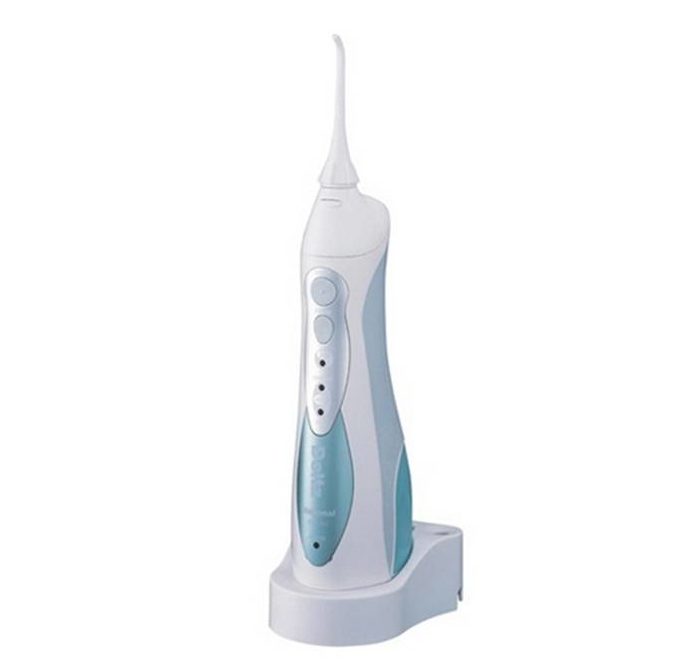
Advantages:
- Liquid ozonation function;
- Wear-resistant;
- Water resistant, can be used in the shower;
- Charges quickly;
- The battery capacity is sufficient for 25-30 applications.
Disadvantages:
- Very small volume of the fluid tank;
- With prolonged use, problems arise with the attachment of the attachments.
CS Medica AquaPulsar OS-1
The eighth position is occupied by the stationary irrigator CS Medica AquaPulsar OS-1. The average price is 3200 rubles.
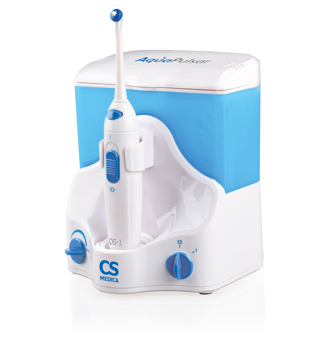
Advantages:
- Good volume of liquid reservoir (500 ml);
- There is a hanging bracket;
- Two functional modes;
- Smooth pressure control;
- Ripple frequency 1800 per minute;
- 4 types of attachments;
- Household concentrates and household liquids can be used.
Disadvantages:
- Strong vibration during normal operation;
- With prolonged use, problems with attachment of attachments may arise.
Philips Sonicare Air Floss
On the seventh line of the rating is a portable device from the Dutch manufacturer Philips Sonicare Air Floss. The average price is 6,000 rubles.
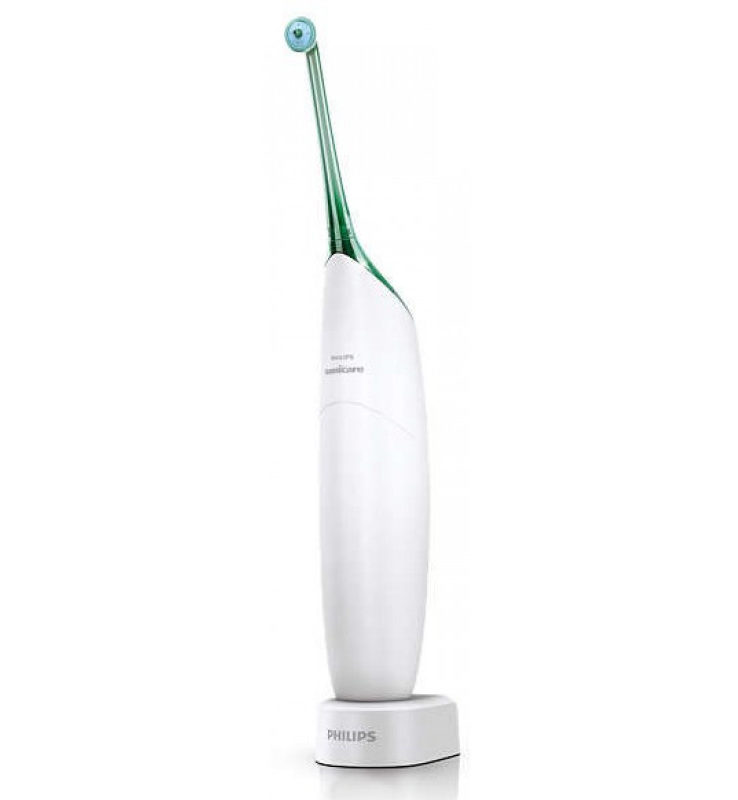
Advantages:
- Compact and lightweight (weight 430 grams);
- Convenient transport case;
- Ergonomic handle with anti-slip pads;
- Full cleaning cycle 30 seconds;
- Ease of use;
- Microbubble technology;
- Almost no noise when working;
- Battery charge indicator;
- 2 year warranty.
Disadvantages:
- Complete with only one type of attachments;
- One operating mode;
- High price;
- Small compartment for liquid.
Donfeel OR-820 D
The sixth place was given to the Russian-made stationary irrigator donfeel OR-820 D compact. The average price is 3700 rubles.
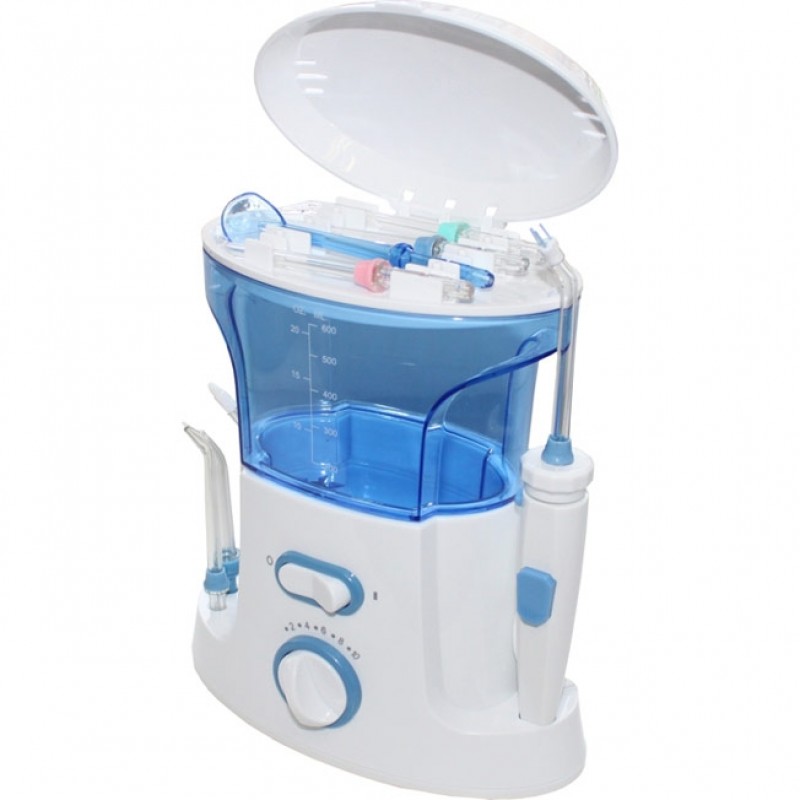
Advantages:
- Microbubble technology;
- 10 work programs (from 81 kPa to 680 kPa);
- 10 nozzles, including one for the tongue, monojet, for the care of gums, braces, implants and crowns;
- Small size.
Disadvantages:
- The fasteners of the liquid container lid wear out quickly;
- Noisy;
- Short hose 80 cm.
Aquajet LD-A7
On the fifth line of the rating is a pulse irrigator from Singapore. The average price is 3000 rubles.
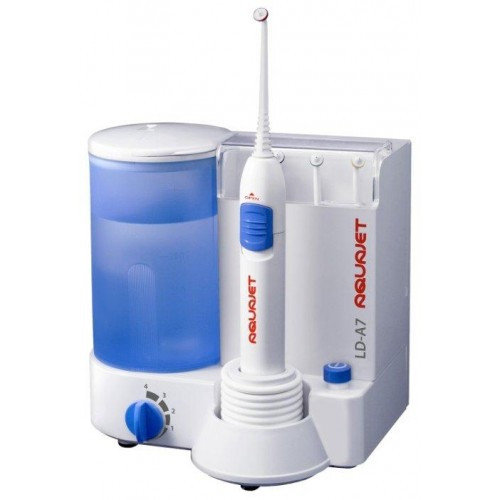
Advantages:
- 4 work programs from 290 kPa to 810 kPa;
- Smooth switching;
- Good build quality
- 0.5 liter capacity;
- Bracket mount.
Disadvantages:
- Large body size;
- Noisy;
- Includes only 4 standard nozzles.
WaterPik WP-450 E2
In fourth place is the waterPik WP-450 E2 portable irrigator. The average price is 5200 rubles.
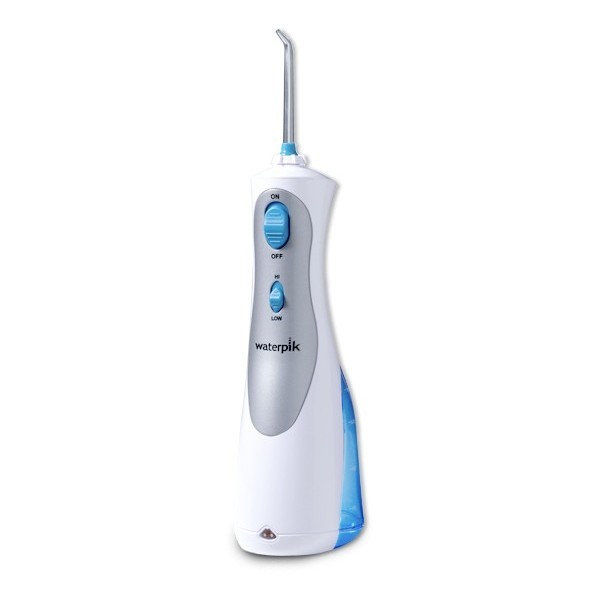
Advantages:
- Reliable motor (1450 vibrations / minute);
- The battery charge is sufficient for a week of use;
- Sufficient container size - 220 ml;
- Sparing (210 kPa) and standard (520 kPa) modes
- The set includes four nozzles: universal, for cleaning the tongue, braces, for the care of implants.
Disadvantages:
- There is no carrying case.
- Requires battery replacement after a year of intensive use.
Braun Oral-B Professional Care OxyJet MD20
The Braun Oral-B Professional Care OxyJet MD20 model opens the top three. The average price is 6,000 rubles.
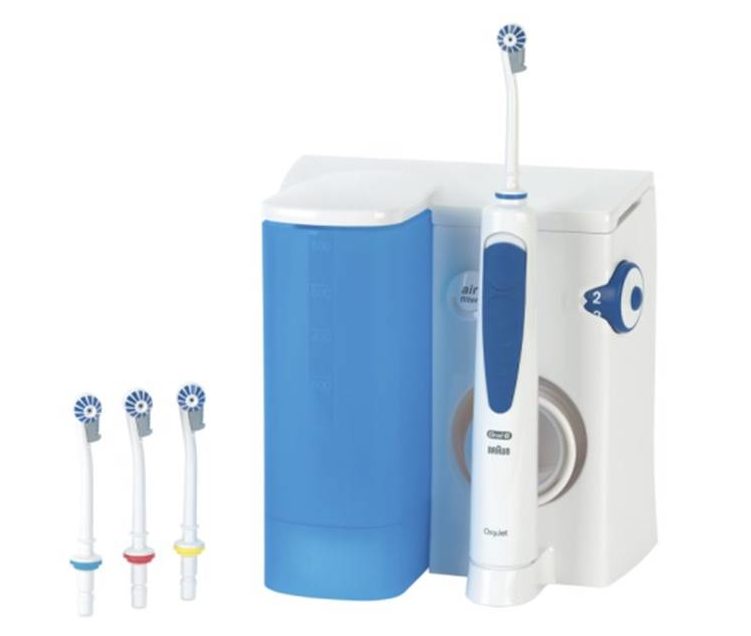
Advantages:
- Two work options: mono and turbo stream;
- Microbubble technology;
- Smooth switching of the jet pressure from 150 kPa to 600 kPa;
- Conveniently fixed on any surface with a bracket;
- 4 types of attachments.
Disadvantages:
- Short power cord.
Rio Professional Water Flosser & Oral Irrigator
In second place is the stationary Rio Professional Water Flosser & Oral Irrigator. Average price - 5800.
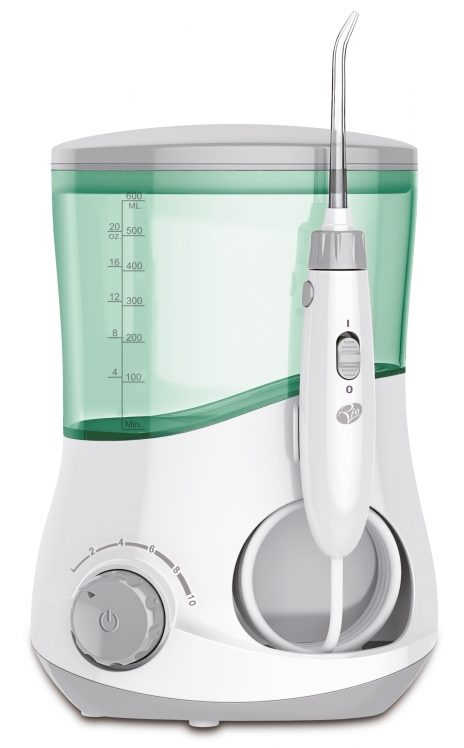
Advantages:
- Pulse type with a frequency of 1400 per minute;
- 10 operating modes;
- Step adjustment of the jet pressure from 200 to 700 kPa;
- The capacity of the liquid compartment is 580 ml;
- Nozzles rotate 360 degrees;
- Timer;
- 4 types of attachments (standard, for cleaning the tongue, gums, braces).
Disadvantages:
- The location of the power button is not very convenient, there is a risk of accidentally pressing it.
Waterpik WP-452 E2 Ultra Professional Designer Series
The first line of the rating is rightfully taken by the reliable stationary model waterpik WP-452 E2 Ultra Professional Designer Series. The average price is 7,000 rubles.
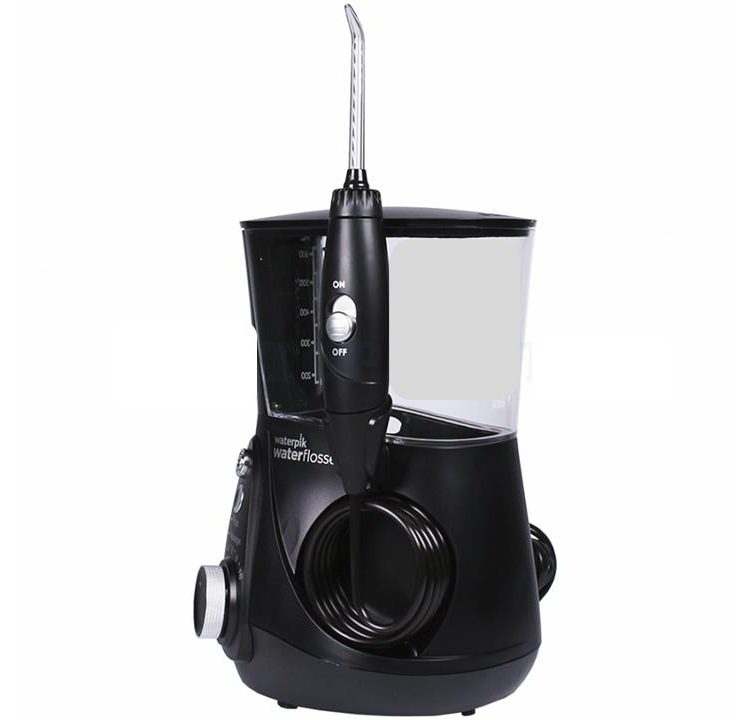
Advantages:
- Reliable motor (power 1400 pulsations / min);
- Two options for work programs;
- LED indicators;
- Soft pressure regulation from 70 kPa to 690 kPa;
- Timer;
- On the handle there is a power button;
- Capacity 650 ml;
- 7 types of attachments;
- Double lid of the water tank;
- Stylish design.
disadvantages
- Short electrical wire.
Dental centers
Dental centers can provide more professional care. These are devices that combine an electric toothbrush and an irrigator. Great for family use. There are two main drawbacks - the large size of the gadget and the high cost. We present a rating of quality models of dental centers.
Dentalpik Home Center Pro 50
The third line of the rating is taken by the dental center from the famous brand Dentalpik, the complex includes the dentalpik Pro 50 electrosonic toothbrush and a portable irrigator. The average price is 9,000 rubles.
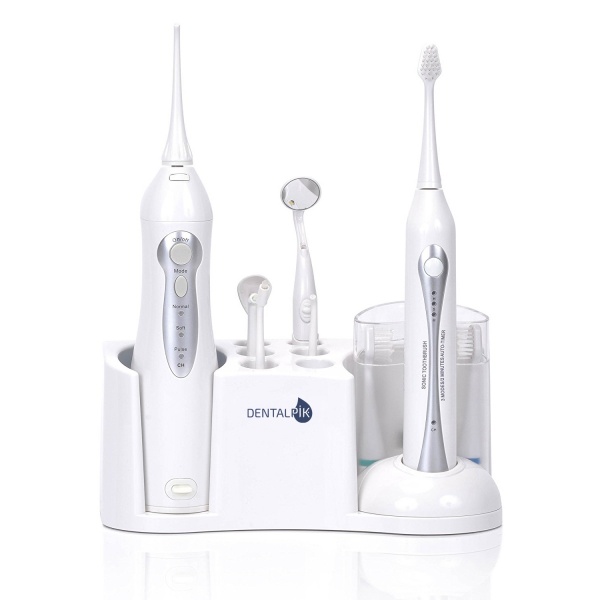
Advantages:
- The irrigator operates at a frequency of 1600 pulsations per minute, the toothbrush - 37000 swing movements per minute;
- Three main work programs;
- Timer;
- A good set of toothbrush heads: universal and orthodontics. For an irrigator, universal, orthodontics, for cleaning the tongue.
disadvantages
- Small water compartment -150 ml;
- Extra large stand;
- Noisy.
Jetpik JP200-Elite
In second place is the jetpic JP200-Elite dental center from the Chinese manufacturer for family use. The average price is 11,000 rubles.
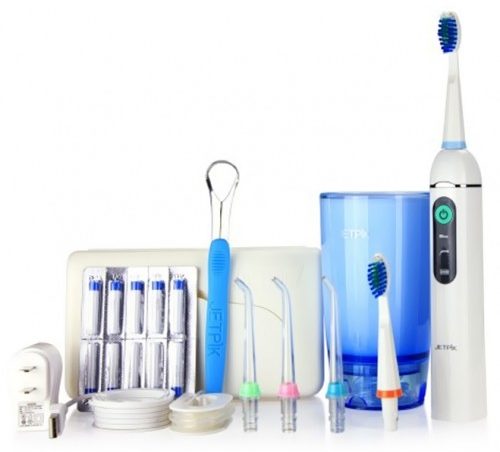
Advantages:
- Electrosonic toothbrush;
- 200 - 550 kPa - adjustable water jet pressure;
- 2 operating modes;
- Power 1500 impulses / minute;
- Possibility of contactless charging;
- Compartment for attachments;
- Smart floss function;
- Floss cartridges - 10 pcs;
- 3 nozzles for jet cleaning;
- Bowl with fluid supply function;
- Hose with Travel clip.
Disadvantages:
- No attachments for the care of braces;
- The maximum head sometimes knocks out the head of the irrigator.
Braun Oral-B ProfessionalCare 8500 OxyJet Center
In the first place is the dental center combining a microbubble irrigator and an Oral-B Professional Care 3000 electric toothbrush. The average price is 8000 rubles.
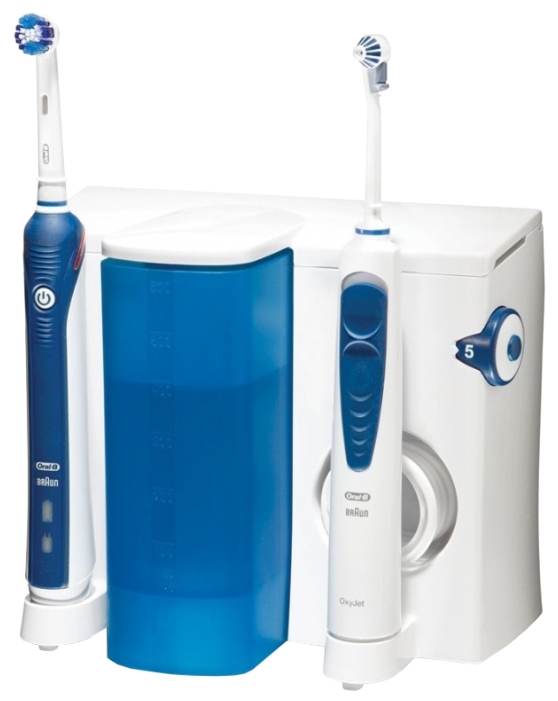
Advantages:
- Microbubble technology;
- Two main modes of operation;
- Large set of attachments;
- It can work without recharging up to 10 days;
- Timer, the device automatically turns off after two minutes;
- The ability to smoothly change the jet pressure;
- Bowl volume 600 ml;
- 6 interchangeable tips: floss action, 3D white, sensitive, universal, for interdental spaces, for treating cheeks and tongue;
- The Oral-B professional care electric toothbrush with 3D technology performs 40,000 pulsating and 8,800 strokes per minute;
- Pressure indicator, to prevent injury to delicate gum tissue when over-pressed, the brush automatically turns off.
disadvantages
- The battery charges on average about 16-18 hours;
- Sometimes the power button can sink.
How to choose an irrigator. Criterias of choice
You can buy the device in pharmacies, specialized medical equipment stores, household appliances departments or via the Internet. Before placing an order, be sure to review the accompanying documents and customer reviews. In the store, you can ask the sales assistant to help you with the choice, demonstrate different models, and conduct a kind of test drive. When choosing the best option, make a list of important parameters for yourself that determine your needs and operating conditions.
- Device type - stationary models are preferable for home use, portable ones for travel.
- The method of cleaning the oral cavity is monojet, impulse or micro-bubble.
- The volume of the liquid compartment - in stationary models, the volume of the reservoir can be from 500 to 1000 ml, in portable devices - from 120 to 250 ml.
- The number and type of attachments - from 4 to 10 in the set. If braces or implants are installed, you need to select an extended model.
- The force of pressure is an important criterion if the device will be used by children or people with bleeding gums. In this case, there should be a gentle regime.
- Modes of operation: in different models the number of modes varies from 1 to 5. Ripple, turbo flow, micromassage, spray are more common.
- Power: for stationary devices, the optimal level is 600-800 kPa, for portable devices - 300-600 kPa.
- Pulse frequency: 900 to 3000 pulses per minute. For home use, it is better to choose values of 1200-1400 im / min.
- Time of continuous use. This parameter depends on the power of the battery, it is better to choose lithium-ion batteries, which allow using the device without recharging for up to 10 days.
- Power cord length. At first glance, this does not in any way affect the operation of the device, but the convenience of use depends on the length of the cord without attracting additional extension cords. Evaluate if the problem base can be connected to the power in your bathroom.
- The length of the connecting tube - this parameter is individual, it can be from 70 to 150 cm.For stationary models, the optimal value that ensures comfortable use should be at least 110 cm.
- The quality of the mounts. Make sure that all fasteners are easy to connect, do not open and do not slip during operation, and water does not leak anywhere.
- Device warranty. Manufacturers who value their reputation, as a rule, set a warranty period from 18 months to 2 years.
Irrigators are great oral care aides. Effectively cleaning not only the surface of the teeth, but also the interdental spaces, periodontal pockets, tongue and cheeks, the device protects against caries, gum disease, and bad breath. When installing braces and implants, the irrigator simply cannot be replaced. For home use, it is better to choose stationary models with a wide range of options. If you have to travel frequently, portable devices with a good battery are ideal.


